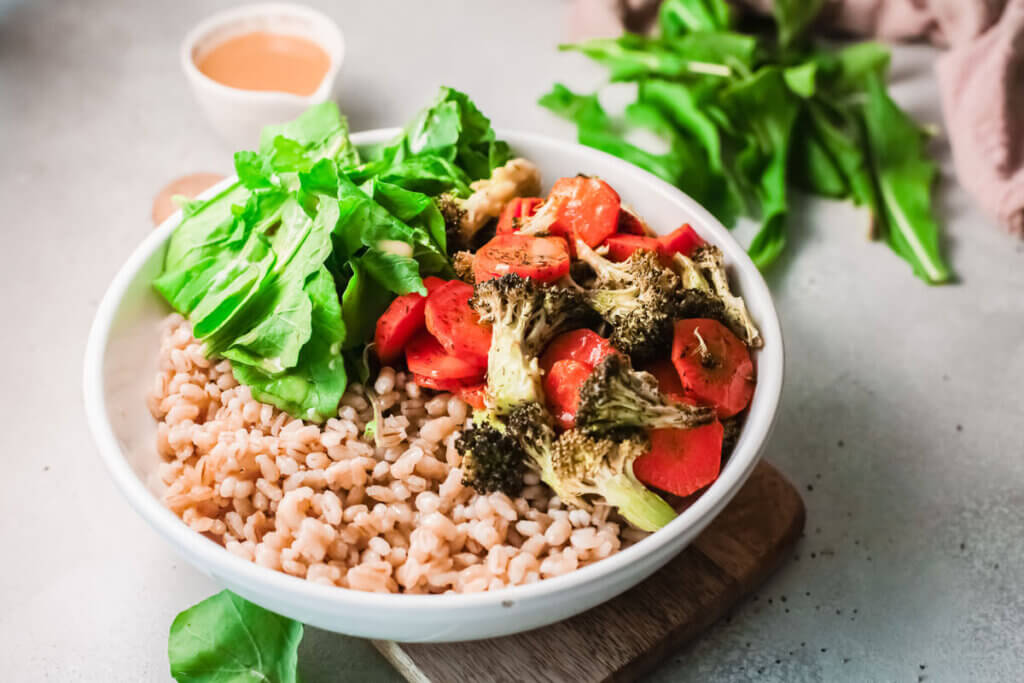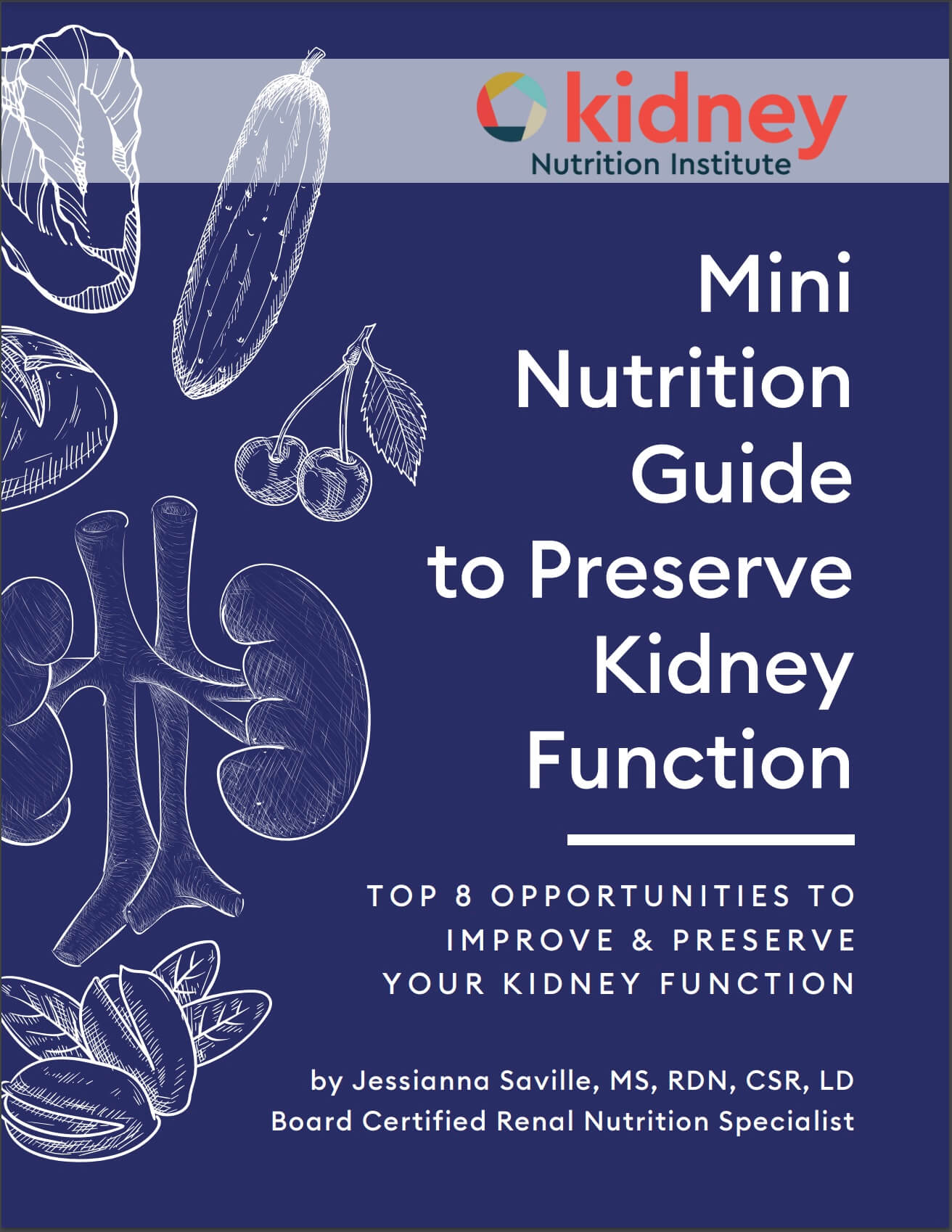In the United States, February is American Heart Month and is an important reminder for us to take care of #Ourhearts! If you have chronic kidney disease, caring for your heart is just as important as caring for your kidneys.
But it can be overwhelming and confusing when heart-healthy diet recommendations conflict with the kidney-friendly diet. The Mediterranean Diet, for example, is well known to prevent heart disease but includes many of the foods on the avoid list for kidney disease.
In this article, we’ll review how the Mediterranean diet can reduce your risk of cardiovascular disease and support your kidney health!

What is the Mediterranean Diet?
The Mediterranean diet, or “MedDiet” for short, refers to a dietary pattern originating from the countries bordering the Mediterranean sea, including Italy and Greece.
Interest in the Mediterranean diet began in the 1960s when researchers discovered lower rates of cardiovascular disease and stroke in these countries compared to other countries worldwide. Since the 1960s, numerous studies and strong evidence support that a Mediterranean diet can help prevent heart attack and stroke (1).
The Mediterranean diet has been voted the #1 diet by U.S. News & World Report for the 5th time in a row in 2022. But, here’s the kicker: it’s not a diet! Instead, it’s a lifestyle that encourages daily physical activity coupled with a whole-food, plant-based diet. It is no surprise to us that this type of lifestyle lends results! Whole-food, plant-based diets are part of our core Kidney Health Method™ and something we talk about with our patients when helping them learn what to eat. We
Foods featured in the Mediterrannean Diet
What is it about this eating pattern that makes it so synergistic for health? A few different features of the MedDiet make it one of the healthiest diets on earth; first, it is full of heart-healthy fats; second, high in fiber, and lastly, rich in polyphenols.
The list below outlines the different foods included in the Mediterranean dietary pattern and how often they are eaten. (We know that you’re going to read this and probably think you can’t have any of them! But you can!)
High amounts:
- Fruits and vegetables
- Whole grains (yes okay!)
- Nuts (Yes, again… okay for kidney disease!)
- Beans and legumes (AND again – totally fine for kidneys! more below)
- Olive oil
Moderate amounts:
- Fish, poultry
- Dairy
- Red wine
Low amounts:
- Red meat
- Sweets
- Eggs
- Processed convenience foods
It’s not just how these foods in isolation make an impact; it is how they work together synergistically to provide significant benefits to heart health!
If the foods listed above have you feeling conflicted, you are not alone! If you have CKD, you’ve probably heard that you should avoid whole grains, nuts, and beans because of the phosphorus and potassium.
The truth is that many people with CKD don’t need to restrict all of these foods; in fact, newer research supports that the Mediterranean diet can positively impact kidney health! (2)
How can the Mediterranean diet support kidney health?
Simply put – a MedDiet lowers inflammation and nourishes the gut – both critical for kidney success. But also, did you know that the number one cause of death in chronic kidney disease is not kidney disease? Instead, cardiovascular disease is the leading cause of death for people with kidney disease.
Therefore, kidney and cardiovascular health are connected, and focusing on diet and lifestyle habits that protect your heart can help you live a healthier longer life!
As a result of this newer research, the 2020 update on the KDOQI clinical practice guidelines for nutrition in CKD recommends the Mediterranean diet for stages 1-5 who are not on dialysis or post-transplant to help improve or prevent dyslipidemia. (3)
It turns out that the traditional renal diet isn’t very heart-healthy at all. Michelle Routhenstein, MS, RD, CDE, CDN, an expert dietitian in cardiovascular disease, wrote an excellent article on this exact subject, and we couldn’t agree more! In other words, the traditional and outdated renal diet restricts some of the most heart-healthy foods!
Fortunately, the tides are turning! Let’s review some of the significant features of the Mediterranean diet and how they directly impact kidney health!

Fat
The MedDiet is full of unsaturated fats from plant sources, including:
- Olive oil
- Nuts
- Seeds
There is also a focus on Omega 3 fatty acids from fish and seafood. These fats can help reduce inflammation, increase satiety, and provide a great energy source if you follow a low or very-low protein diet to help maintain kidney function.
Plant-based protein
One of the strategies for delaying kidney disease progression is to limit protein. Leaning on plant-based proteins and limiting or avoiding animal protein is a great way to decrease protein and add many beneficial nutrients!
Fortunately, the MedDiet focuses heavily on plant-based protein sources, including:
- Beans/legumes
- Nuts
- Whole grains
Fruits and vegetables
Fruits and vegetables are the MVP for health, including kidney health! They are low in calories yet full of fiber, vitamins, minerals, and beneficial compounds found in plants called polyphenols!
Studies show that fruits and vegetables benefit the kidneys in several ways:
- They can help lower blood pressure (4)
- Improves metabolic acidosis (5)
- Fiber from fruits and vegetables promotes gut health (6), removes waste from the body (including uremic toxins) (7), and improves blood sugar management (8)
Making the Mediterranean diet work for kidney health!
Before diving right into the Mediterranean lifestyle, there are some important things to consider if you have CKD. First, because there is no one-size-fits-all approach to a kidney-friendly diet, you may need to adjust the MedDiet for your individual needs, particularly on protein.
We’ll walk through some of the specific nutrients to keep in mind, but the #1 strategy is to have an expert renal dietitian (that’s us!) in your corner! A renal dietitian can help you develop a personalized plan to incorporate the Mediterranean diet effectively.
Working with a renal dietitian

A renal dietitian is a dietitian who has expertise in the nutritional management of kidney disease. At KNI, we utilize our proprietary Kidney Health Method™, love for food, and cutting-edge science to help our patients create an approach that works for them.
How can you find a renal dietitian to work with? Check out our suggestions below!
- Ask your Nephrologist for a referral
- Kidney Nutrition Institute (KNI) has a team of expert renal dietitians ready to help you
- Check out the National Kidney Foundations CKD Dietitian Database to find a qualified renal dietitian near you
Protein:
We all have unique protein needs. Knowing how much protein is right for you is essential because having too much or too little protein can impact your kidney health.
An experienced renal dietitian can help you understand your unique protein requirements, which depend on many factors, including:
- Weight
- Stage of CKD
- The presence of other diseases like cancer or diabetes
- Whether or not you are on dialysis
The Mediterranean dietary pattern does not limit the quantity of protein, so being mindful of your total protein intake and quantity of animal-based protein intake is one of the ways you can customize the MedDiet for your best kidney outcomes.
Potassium:
Potassium is one of the essential minerals found in various food. However, just like with protein, there is no one-size-fits-all amount of potassium! Some people need a lot of potassium, and some people need to limit potassium. One of the core components of our expert work in the Kidney Health Method™ is getting potassium right. Each person with CKD has unique potassium requirements that depend on many factors, including:
- Kidney function
- Medications
- Other diseases or medical conditions
Many foods included in the MedDiet, such as fruits, vegetables, whole grains, nuts, and beans, are rich sources of potassium. However, if these foods replace less beneficial high potassium foods, developing high blood potassium levels (hyperkalemia) is unlikely.
So what are some high potassium foods to consider limiting to make room for more healthy plant foods? Check out the list below for ideas to swap high potassium foods for a more MedDiet friendly option!
In addition, check out our low potassium guide with a long list of low potassium fruits and vegetables to include!
Swap your High potassiumSAD choices for smart lower potassium Mediterranean choices!
| Standard American Diet (SAD) choice | Potassium* | Mediterranean Swap | Potassium* |
| 1-ounce potato chips, plain salted | 340 mg | 1-ounce walnuts | 125 mg |
| 4 ounces ground beef | 305 mg | 1 cup canned chickpeas (drained and rinsed) | 165 mg |
| Medium fast-food French fries | 677 mg | 1 cup sliced red bell pepper | 194 mg |
| 1 cup raisin bran | 310 mg | ½ cup oatmeal | 147 mg |
| 1 cup orange juice | 447 mg | 1 medium orange | 255 mg |
If you’re still concerned about how much potassium is safe for you, check with your physician or dietitian!
Phosphorus
Phosphorus is another mineral found in various foods that people with CKD need to be aware of. Unfortunately, some outdated renal diet sources recommend avoiding plant-based foods high in phosphorus, including beans, nuts, and whole grains.
While these foods do contain phosphorus, plant-based sources of phosphorus cannot be fully absorbed by the body because it is bound to fiber. Studies show that only 40-60% of the phosphorus from plant foods is fully absorbed. (9)
Compared to dairy and meat sources which are upwards of 60-80%, respectively, we’re not sure why plant-foods get such a bad reputation. Especially since they also provide fiber and are directly linked to improved cardiovascular health! (10)
In addition, many of us get a heavy hit of phosphorus from foods that have phosphate added to them. If you’re not familiar with phosphate additives and have CKD, you’ve got to read our post on how to look for phosphorus added to foods and why it’s essential to avoid them!
Phosphate additives are typically found in processed foods. Fortunately, the Mediterranean diet focuses heavily on whole-foods and plants and is much lower in phosphorus.
Tools for incorporating a Mediterranean diet into your kidney health plan!
Now that you understand the benefits of the Mediterranean diet for heart and kidney health and how to adapt it to the renal diet, let’s check out some tips and tools to help incorporate the MedDiet into your life!
Recipes
No matter how much we understand about the nutritional benefits of any diet, if the food doesn’t taste good, we’re not going to want to eat it! That’s why we’re rounding up some of our favorite recipes that are sure to tantalize your taste buds in addition to improving your health!

Recipes:
- Mediterranean Pasta with Kale
- Summer Vegetable Panini
- Roasted Cauliflower & Chickpea Hummus
- Roasted Veggie & Barley Bowl
Websites
Old Ways is one of the original organizations dedicated to promoting the Mediterranean diet and also developed the whole grain stamp of approval! Their website includes a list of traditional heritage dietary resources and recipes, including African and Latin. Keep in mind that the recipes are not controlled for sodium, potassium, or phosphorus.
A great place to find information on heart health and heart-healthy recipes! These recipes will be low in sodium but may not be low in potassium.
Fellow dietitian Bill Bradley provides lots of information on the benefits of the Mediterranean diet and a ton of delicious Mediterranean recipes! Make sure to keep an eye out for sodium and potassium if these are a concern for you.
Although Suzy, the creator of the Mediterranean Dish, is not a Dietitian, she is a daughter of the Mediterranean and knows how to create the most flavorful dishes! Most of her recipes include potassium and sodium content, so it’s easy to choose recipes based on your individual needs.
In conclusion
The Mediterranean Diet includes foods that are great for your cardiovascular health! If you are living with kidney disease, taking steps to protect your heart health is essential!
Although some old renal diet information recommends limiting or avoiding many of the foods included in the Mediterranean diet, newer evidence shows that there are ways to incorporate these foods into your renal diet plan safely that can improve your kidney health!
Here are the key steps!
- Partner with a renal dietitian who will help you develop a personalized plan for potassium, protein, and phosphorus
- Include heart healthy fats like olive oil in abundance and fish or seafood at least twice per week
- Understand your unique protein needs and try adding more plant-based proteins like beans, nuts, and whole grains and limit animal proteins like red meat
- Include plentiful amounts of fruits and vegetables. If potassium is a concern for you, be sure to choose lower potassium fruits and vegetables
Work with us!
Having a renal dietitian in your corner helps you feel confident in answering the question, “What should I eat to keep my kidneys strong?” But our Kidney Health Method™ is much more than just what you should eat. Our unique, whole-person approach to nutrition also helps shift your mindset from fighting kidney disease to promoting kidney health.
Join our free monthly class to uncover the basics of a kidney-healthy diet, or schedule a complimentary discovery call and learn more about how KNI’s expert dietitians help you develop a personalized plan for long-term health!

